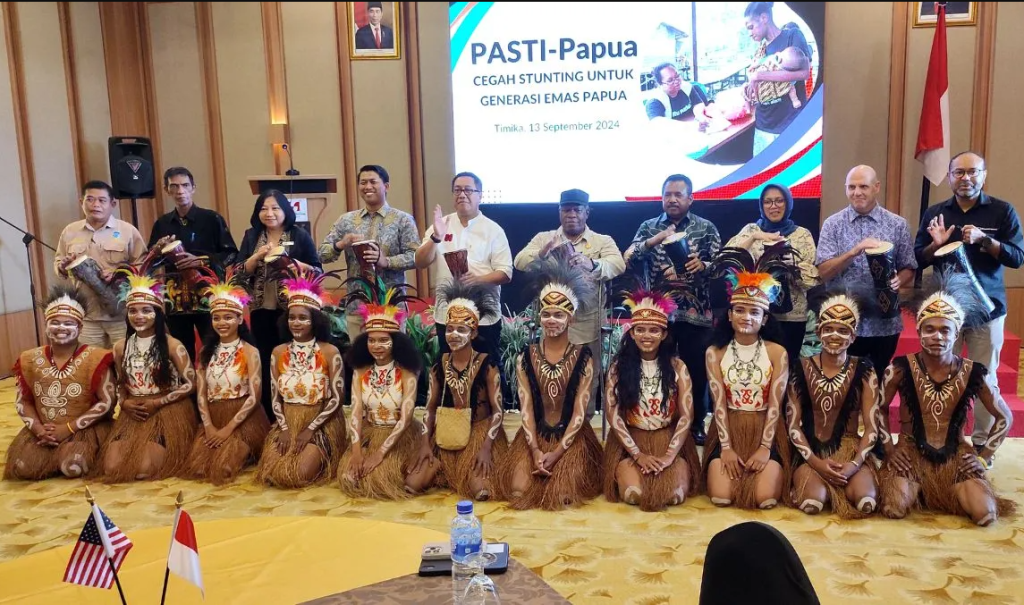PapuaAround.com – The Ministry of Health of the Republic of Indonesia (Kemenkes RI), in collaboration with PT Freeport Indonesia (PTFI) and the United States Agency for International Development (USAID), officially launched the Partnership to Accelerate Stunting Reduction in Indonesia or PASTI-Papua program. This initiative aims to accelerate the reduction of stunting and improve the nutritional status of children in Papua, particularly in three regions: Mimika and Nabire in Central Papua and Asmat in South Papua.
During the program’s launch on Friday, September 13, 2024, Director General of Public Health at the Ministry of Health, Dr. Maria E. Sumiwi, emphasized that this cross-sector collaboration aligns with the government’s efforts to create high-quality and competitive Human Resources (HR) in Indonesia.
“Promotive and preventive approaches are fundamental in preventing new cases of stunting in Indonesia. Through the PASTI-Papua program, we hope to enhance cross-sector coordination and accelerate the reduction of stunting in the Papua region,” Maria stated in a written statement on Saturday, September 14, 2024.
Stunting in Papua Remains a Serious Issue
According to the 2023 Indonesian Health Survey (SKI), Central Papua recorded a stunting prevalence rate of 39.4%, with 46,128 cases. In South Papua, the stunting prevalence rate reached 25%, with 33,304 cases.
These figures are far from the government’s target of reducing the national stunting prevalence rate to 14% by 2024. If left unaddressed, stunted children are at risk of experiencing brain development disorders, which can negatively affect their cognitive abilities and future productivity.
Key challenges in tackling stunting in Papua include the public’s limited knowledge of the importance of prenatal care, child health monitoring at Posyandu (community health posts), and empowering the use of nutritious local food.
Support from USAID and Freeport Indonesia
Jeff Cohen, Director of USAID Indonesia, expressed the U.S. government’s enthusiasm for partnering with PT Freeport Indonesia and the Ministry of Health to support efforts to reduce stunting in Papua.
“We are pleased to collaborate with PT Freeport Indonesia in supporting the Indonesian government’s efforts to prevent childhood stunting in Central and South Papua. Through partnerships with local communities, regional governments, and other stakeholders, we will develop sustainable solutions to address the root causes of stunting,” Cohen stated.
Claus Wamafma, Director and Executive Vice President of Sustainable Development at PTFI, echoed these sentiments, emphasizing Freeport Indonesia’s commitment to improving the quality of life for communities in its operational areas, including through health program investments.
“With the integrated and collaborative PASTI-Papua program, we are confident that we can accelerate efforts to reduce stunting and improve children’s nutritional status, thereby ensuring the health of the Papua population is well-protected,” Wamafma said.
Read also: Exploring the Rich Heritage of Papua Traditional Songs
Local Government’s Role and Stunting Reduction Strategy
Mimika Regency Secretary, Petrus Yumte, highlighted the importance of implementing stunting reduction interventions in an integrated manner, using a holistic approach that involves multiple parties and sectors.
“The regional government is committed to reducing the stunting rate to 14% by 2024. Through the PASTI-Papua program, we aim to implement behavioral change strategies, particularly to promote breastfeeding (ASI) and healthy eating practices tailored to local contexts,” Yumte explained.
PASTI-Papua is designed to enhance community-based nutrition and health practices through three main approaches. First, by implementing social behavior change communication interventions that engage community leaders. Second, by improving the quality of healthcare services at Puskesmas (community health centers), focusing on integrated and comprehensive primary care for mothers, children, and adolescents. Third, by strengthening institutional capacity and collaborative governance among stakeholders to support the National Action Plan for Accelerating Stunting Reduction (RAN-PASTI) at the sub-national level.
Wahana Visi Indonesia and Program Implementation
The PASTI-Papua program will be implemented by Wahana Visi Indonesia, a humanitarian and community development organization. Representing the organization at the program launch was Angelina Theodora, National Director of Wahana Visi Indonesia, who expressed readiness to collaborate in the program’s implementation.
This initiative is expected to significantly impact efforts to reduce stunting in Papua, while also providing sustainable solutions to improve the health and well-being of children in the region.
With the launch of PASTI-Papua, the synergy between the government, private sector, and international organizations is expected to contribute to achieving Indonesia’s stunting reduction targets, especially in Papua, and to build a healthier and more productive future generation.
Source: Detik.

